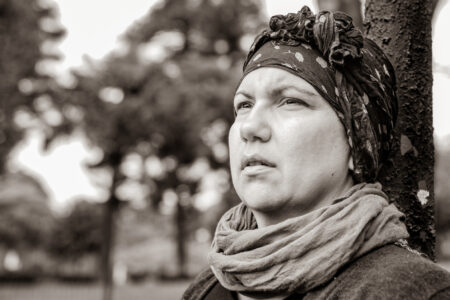
Share On Social!
Created in 2016 by President Joe Biden, the Cancer Moonshot initiative aims to accelerate the rate of progress against cancer.
Since then, the government program has accomplished a lot, including more than 2,000 scientific publications and 49 clinical trials – all to better understand how to treat and prevent cancer.
President Biden has now reignited the Cancer Moonshot program and set a new national goal: cutting the death rate from cancer by at least 50% over the next 25 years, and improving the experience of people and their families living with and surviving cancer.
But how will the Cancer Moonshot impact Latinos?
The Latino Cancer Crisis
Cancer is the #1 cause of death in Latinos. Latino cancer cases are expected to rise 142% in coming years.
There are higher rates of certain cancers among Latinos. For example:
- Latinos suffer 2x higher rates of liver & stomach cancers than white people.
- Latinas are 40% more likely to be diagnosed with cervical cancer than white women.
“The thing that makes Latino cancer such an alarming and attention-deserving disparity, is the ongoing growth in number of the U.S. Latino population, coupled with the systemic inequities that continue to drive cancer rates and later-stage diagnoses in this population,” said Dr. Amelie Ramirez, director of Salud America! and its home base, the Institute for Health Promotion Research at UT Health San Antonio. “Those inequities are seen in everything from access to quality healthcare, less uptake of screening, to less access to healthy food, places to play, and reliable housing and transportation, to issues of discrimination and bias.”
Other issues that complicate these systemic health inequities are the lower participation of Latinos in clinical trials and the lack of diversity among cancer care providers.
“To achieve equitable participation of Latinos in clinical research, we need comprehensive approaches that address social and contextual barriers to participation,” Ramirez said.
How Does the Cancer Moonshot Initiative Impact Latinos?
The Cancer Moonshot initiative potentially benefits Latinos in several ways, according to the White House:
Lowering the Cost of Prescription Drugs for Cancer Patients. President Biden’s Inflation Reduction Act caps out-of-pocket prescription drug costs at $2,000 per year for Medicare beneficiaries. This means that tens of thousands of cancer patients could see their prescription drug costs go down by thousands annually. This is good news for Latinos, who are already more likely to be low income and have poorer cancer health outcomes than other groups due to systemic issues.
Diversifying the Next Generation of Cancer Researchers Through the Cancer Moonshot Scholars Program. The National Cancer Institute (NCI) will invest in the next generation of cancer researchers with a focus on diversity. Studies show that minority populations, such as Latinos, are sorely underrepresented in clinical research and the healthcare workforce. This underrepresentation can lead to worse health outcomes for minority cancer patients compared to their white peers.
Investing in Telehealth to Improve Cancer Care: NCI has invested $23 million to support the creation of a Telehealth Research Centers of Excellence (TRACE), which will study the role of telehealth in cancer prevention, screening, diagnosis, treatment, survivorship, and equity of access and outcomes. Telehealth has proven useful to treat obesity and other health issues. While some populations don’t have access to telehealth services, investment in this service for cancer patients could still prove beneficial for some Latinos.
Investing in Cancer Treatment Technology and Clinical Trials. Improved technology could help cancer treatments come to fruition faster through a more efficient development system. Meanwhile, a national trial launched by NCI will study the effectiveness of cancer-detecting blood tests. This new trial will begin enrolling participants in 2024 will test 24,000 healthy patients over four years. If the findings seem promising, a clinical trial almost 10 times as large will commence, according to MIT Technology Review. For Latinos, who are often diagnosed with cancer later than their white peers, the development of new cancer treatments and detection methods could improve health outcomes.
Room for Improvement
Biden’s push to alleviate the cancer burden on Americans is certainly a good step.
But the systemic root causes of cancer morbidity and mortality in vulnerable populations deserves as much attention as possible, Ramirez said.
“Any time there is a renewed push for cancer research and cancer funding, connecting all the various federal agencies and sectors of society together, hosting summits and conversation series – these are all good things that are necessary on our collective journey to end cancer,” Ramirez said. “However, without addressing the systemic inequities that cause the social risk factors that contribute to social needs, social needs will continue to arise in populations of color; and social needs will continue to return in patients who are the sickest, and as a result, require the most expensive care.”
For example, Latinos represent less than 10% of volunteers in cancer clinical trials due to social and contextual barriers to participation.
The lack of Latinos in clinical trials makes it harder for researchers to find treatments tailored for this group — which makes up 18.9% of the US population and a diversity of heritages.
Thus, researchers such as Ramirez and Patricia Chalela, associate professor at Institute for Health Promotion Research at UT Health San Antonio, are hopeful that diversity remains a priority in Cancer Moonshot’s future endeavors, including NCI’s national trial on cancer-detecting blood tests.
“Cancer hurts many of our abuelos, moms, dads, and others we love. Clinical trials help us fight for our familia,” Chalela said. “Latinos who volunteer in clinical trials are helping themselves. And they’re also building a future with better treatments that can help their families in the years to come.”
Additional Steps to Diversify Cancer Clinical Trials
Ramirez and Chalela are creating new ways to urge Latinos to volunteer for clinical trials thanks to a grant from Genentech, a member of the Roche Group.
Does diversity in clinical trials and cancer research really matter?
Yes, just ask Alma Lopez.
Breast cancer is the top cause of death for Latinas, but Lopez has been a breast cancer survivor for more than 15 years.
She believes participating in a clinical trial at UT Health San Antonio helped her get better treatment and better long-term health.
“Clinical trials are great for finding new treatments that help people,” Lopez said. “And it helps the scientists. It gives opportunity to better medication for all populations.”
To learn more about Cancer Moonshot initiative, visit The White House webpage.
Explore More:
CancerBy The Numbers
142
Percent
Expected rise in Latino cancer cases in coming years



